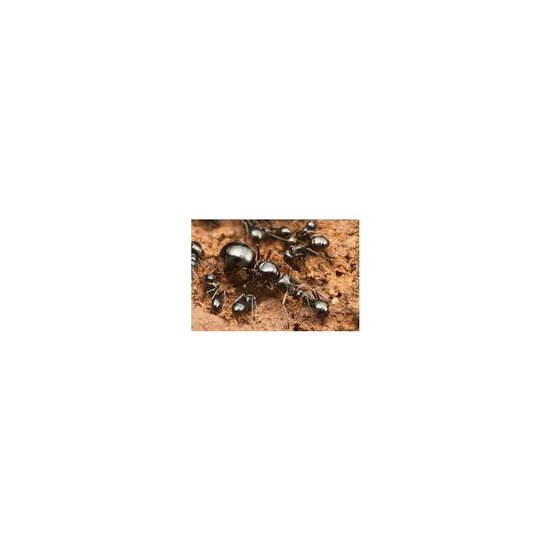

- Ants as pets since 2009 It starts here!
- We ship every working day until 4:30 PM
- Flat shipping costs from €6.99
- Specialists in ants, free advice
Do you have questions about this product?
Or do you need help? Please feel free to contact us, we are happy to help!
Product description
Formica fusca 5-10
Species
The formica fusca ant is one of the best known and most common forest ants. They are known for their considerable speed. Red forest ants start their colony using fusca colonies as slaves. They will take over nests. That is why there ants are also called slave ants. Our ant colonies consist of a queen, a few workers and, depending on the phase, also brood. This number depends on the number of eggs that have developed into an ant (egg-larva-pupa-ant). This colony contains 5 to 10 workers and these workers are produced by the queen itself. The queen lays eggs in stages.
Nutrition
The nutrition set above is a complete diet for this colony. The set contains sugar water, honeydew and fruit flies. A larger colony also requires larger insects to grow.
Suitable for
The ant colony is suitable for acrylic, gypsum and sand ant farms. Due to their size, they are also very suitable for gypsum ant farms and other robust products. We also recommend using an arena. The ants can get their food there and leave their waste. Many products have an integrated arena. If you are looking for ants for a gel ant farm, we recommend the ant family.
Packing and Shipping
In the image you see how we actually supply the ant colony. The colony is in a test tube with a water supply in order to keep the tube nest partially damp. After receipt the colony can be kept in the tube up to a few weeks without any care. We give a 2 weeks warranty for the life of the queen. Does the queen arrive dead or if she dies within a few weeks, we will provide a replacement colony for free.
Specifications and information
Scientific name
Formica Fusca
Common used name
Silky or dusky ant
Difficulty Class
3. Experienced
The species develops very slowly in the beginning. A lot of patience and rest is required and they are very picky eaters. Therefore a difficult species to keep.
Queen | Gyne:
10-12 mm
Workers:
6-10 mm The bigger the colony, the bigger the ants.
Type colony:
Monogyn or polygyne, one or more queen per nest
Type of housing:
Sand Nests, relatively deep, often under stones
Temperature:
Room temperature, 15-30 degrees
Hibernation:
No, but a rest period. Our advice: slightly cooler
around 15 degrees during November-February. For example, in the basement, a cooler attic or barn.
Our experience: even if you keep this species in winter on room temperature the ant colony will develop well.
Nutrition:
Sugar or honey water and small insects:
Our advice for smaller colonies: fruit flies.
Humidity:
Our advice: Keep the nest part from your Ant Farm partially moisture.
Habitat/Origin:
(Southern) Europe and (Northern) Africa
Ant Farm Advice:
Acrylic, gypsum or sand, including the use of an Arena
Comments:
The ants in this colony are impressive. They become large, are beautiful to look at and are very fast. So make sure you keep them in a well-sealed nest and arena if you want to keep these ants. In particular, the beginning of the colony requires a lot of precision, lots of rest, offering the right food and patience.
Formica fusca 5-10
Species
The formica fusca ant is one of the best known and most common forest ants. They are known for their considerable speed. Red forest ants start their colony using fusca colonies as slaves. They will take over nests. That is why there ants are also called slave ants. Our ant colonies consist of a queen, a few workers and, depending on the phase, also brood. This number depends on the number of eggs that have developed into an ant (egg-larva-pupa-ant). This colony contains 5 to 10 workers and these workers are produced by the queen itself. The queen lays eggs in stages.
Nutrition
The nutrition set above is a complete diet for this colony. The set contains sugar water, honeydew and fruit flies. A larger colony also requires larger insects to grow.
Suitable for
The ant colony is suitable for acrylic, gypsum and sand ant farms. Due to their size, they are also very suitable for gypsum ant farms and other robust products. We also recommend using an arena. The ants can get their food there and leave their waste. Many products have an integrated arena. If you are looking for ants for a gel ant farm, we recommend the ant family.
Packing and Shipping
In the image you see how we actually supply the ant colony. The colony is in a test tube with a water supply in order to keep the tube nest partially damp. After receipt the colony can be kept in the tube up to a few weeks without any care. We give a 2 weeks warranty for the life of the queen. Does the queen arrive dead or if she dies within a few weeks, we will provide a replacement colony for free.
Specifications and information
| Scientific name | Formica Fusca |
| Common used name | Silky or dusky ant |
| Difficulty Class |
3. Experienced |
| Queen | Gyne: | 10-12 mm |
| Workers: | 6-10 mm The bigger the colony, the bigger the ants. |
| Type colony: | Monogyn or polygyne, one or more queen per nest |
| Type of housing: | Sand Nests, relatively deep, often under stones |
| Temperature: | Room temperature, 15-30 degrees |
| Hibernation: | No, but a rest period. Our advice: slightly cooler around 15 degrees during November-February. For example, in the basement, a cooler attic or barn. Our experience: even if you keep this species in winter on room temperature the ant colony will develop well. |
| Nutrition: | Sugar or honey water and small insects: Our advice for smaller colonies: fruit flies. |
| Humidity: | Our advice: Keep the nest part from your Ant Farm partially moisture. |
| Habitat/Origin: | (Southern) Europe and (Northern) Africa |
| Ant Farm Advice: | Acrylic, gypsum or sand, including the use of an Arena |
| Comments: |
The ants in this colony are impressive. They become large, are beautiful to look at and are very fast. So make sure you keep them in a well-sealed nest and arena if you want to keep these ants. In particular, the beginning of the colony requires a lot of precision, lots of rest, offering the right food and patience. |
Reviews
No reviews yet
More information...
If you have any questions, please don't hesitate to contact us, we like it! You can reach us via email and WhatsApp. You are welcome in the showroom by appointment for advice and purchase!
Customer service Make an appointment
